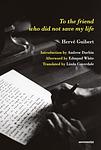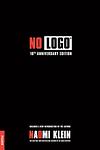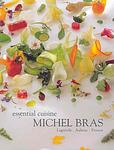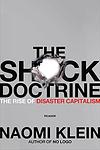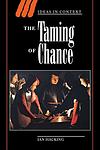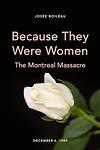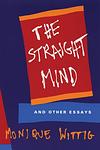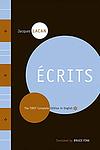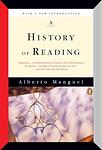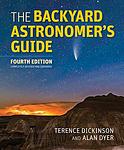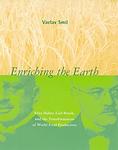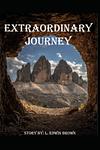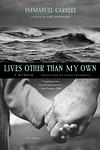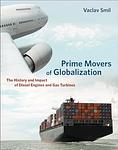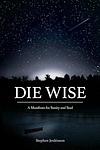The Greatest Canadian, French "Nonfiction" Books Since 1990
Click to learn how this list is calculated.
This list represents a comprehensive and trusted collection of the greatest books. Developed through a specialized algorithm, it brings together 288 'best of' book lists to form a definitive guide to the world's most acclaimed books. For those interested in how these books are chosen, additional details can be found on the rankings page.
Genres
Countries
Date Range
Reading Statistics
Click the button below to see how many of these books you've read!
Download
If you're interested in downloading this list as a CSV file for use in a spreadsheet application, you can easily do so by clicking the button below. Please note that to ensure a manageable file size and faster download, the CSV will include details for only the first 500 books.
Download-
1. To The Friend Who Did Not Save My Life by Hervé Guibert
The book is a candid and harrowing autobiographical novel that chronicles the life of a man grappling with the devastating impact of AIDS during the early years of the epidemic. Through a blend of fact and fiction, the narrative delves into the protagonist's personal experiences with illness, the medical establishment, and the emotional complexities of friendship and mortality. As he confronts his own declining health, the protagonist reflects on the relationships with those around him, including a close friend who is also facing the disease, and the betrayal he feels when a promised miracle cure fails to materialize. The novel is a raw and poignant exploration of the human condition in the face of an unforgiving illness.
-
2. No Logo by Naomi Klein
This book explores the negative effects of corporate branding and globalization. It critiques the marketing strategies of large corporations, arguing that they exploit workers and manipulate consumers. The author also discusses how these corporations have a significant influence on culture and public space. The book suggests that consumer activism and grassroots movements can serve as effective counter-forces to corporate power.
-
3. Outliers by Malcolm Gladwell
The book examines the factors that contribute to high levels of success. Through a compilation of anecdotes and analyses of various cultural phenomena, it argues that success is not simply a result of individual talent or intelligence, but rather the result of a combination of opportunities, hidden advantages, cultural legacies, and the amount of time spent practicing a specific task. The author challenges the traditional notion of the "self-made" individual by emphasizing the importance of external influences and timing, such as being born in a certain era or having access to specific resources, in shaping one's ability to achieve extraordinary accomplishments.
-
4. Essential Cuisine by Michel Bras
"Essential Cuisine" is a comprehensive guide to gourmet cooking, written by a renowned French chef. The book provides readers with recipes that highlight the chef's innovative and unique approach to cooking, focusing on the use of fresh, local ingredients. The book also includes stunning photography of the dishes and the chef's home region, making it as much a visual feast as a culinary one. It is a must-have for anyone interested in haute cuisine and the art of fine dining.
-
5. The Shock Doctrine: The Rise of Disaster Capitalism by Naomi Klein
This book explores the concept of "disaster capitalism", the idea that global capitalism thrives on disaster and chaos. The author argues that free market policies are often pushed through while countries are reeling from wars, natural disasters, or economic crises. She provides a historical analysis of these events, from Chile in the 1970s, to Russia in the 1990s, to the war in Iraq, demonstrating how governments and corporations exploit these periods of shock to implement economic reforms that would otherwise be rejected.
-
6. The Taming of Chance by Ian Hacking
"The Taming of Chance" delves into the evolution of the concept of probability and its societal implications. The book takes the reader through the historical progression of probability and statistics, illustrating how they have shaped and been shaped by societal norms. The author highlights the profound impact of this mathematical concept on various aspects of life, including law, science, and philosophy, and how it has fundamentally changed our perception of the world.
-
7. The Montreal Massacre by Louise Malette and Marie Chalouh
The book provides a detailed account of a tragic event that took place at an engineering school in Montreal, where a gunman targeted female students, resulting in the loss of numerous lives. The authors delve into the societal and cultural factors that may have contributed to the perpetrator's motivations, examining issues of gender-based violence and misogyny. Through interviews, personal reflections, and analysis, the book seeks to honor the victims and explore the broader implications of the event for Canadian society and the ongoing struggle for gender equality.
-
8. The Straight Mind by Monique Wittig
The book is a collection of feminist essays that challenge the conventional understanding of gender and sexuality, positing that the concept of "woman" is a social construct created by a heterosexual society to uphold a binary gender system. The author argues that this system perpetuates the oppression of women and LGBTQ+ individuals by reinforcing the straight mind, a heteronormative way of thinking that marginalizes any form of difference. Through a radical rethinking of language, literature, and social structures, the essays advocate for a new feminist perspective that seeks to dismantle the straight mind and create a society where all forms of identity and expression are valued equally.
-
9. Power Of Now by Eckhart Tolle
The book is a guide to spiritual enlightenment that emphasizes the importance of living in the present moment to achieve true happiness and fulfillment. It argues that many people are trapped in their own minds, dwelling on past regrets or future anxieties, which creates a barrier to inner peace. Through a series of insightful questions and meditations, the book encourages readers to shed their ego-based state of consciousness, embrace the now, and discover a deeper sense of self beyond their thoughts and emotions. The central message is that by connecting with the present moment, individuals can free themselves from suffering, access a higher state of awareness, and experience a profound transformation in their daily lives.
-
10. Capital in the Twenty-First Century by Thomas Piketty
This book provides a comprehensive analysis of the dynamics of capital accumulation and distribution over the last few centuries. The author argues that the rate of capital return in developed countries is persistently greater than the rate of economic growth, leading to high levels of wealth inequality. The book further suggests that the level of income inequality is not primarily a result of differences in individual labor income but rather the result of differences in capital ownership and the income derived from it. The author proposes a global tax on wealth to prevent soaring inequality.
-
11. The Warrior's Honor: Ethnic War and the Modern Conscience by Michael Ignatieff
The book explores the moral and ethical challenges faced by modern societies when confronted with ethnic conflicts and wars. It delves into the complexities of humanitarian intervention, the role of the media in shaping public perception, and the struggle to reconcile the principles of human rights with the brutal realities of ethnic violence. Through a series of case studies and philosophical reflections, the author examines the tension between the universal claims of morality and the particular loyalties of kinship and nationality, questioning the capacity of moral conscience to mediate in conflicts where deep-seated cultural and ethnic animosities are at play.
-
12. Écrits: The First Complete Edition in English by Jacques Lacan
This book is a comprehensive collection of essays by a renowned psychoanalyst, offering readers an in-depth understanding of his theories on human psychology. The author delves into complex topics such as the unconscious, the mirror stage, and the concept of the Other, while also exploring the intersection of psychoanalysis with philosophy, linguistics, and anthropology. The book challenges conventional understanding of subjectivity and identity, making it a seminal work in the field of psychoanalysis.
-
13. A History Of Reading by Alberto Manguel
This book offers a captivating exploration of the evolution of reading throughout the centuries, tracing its transformation from a privileged art practiced by a select few to a widespread pastime enjoyed by many. The narrative delves into the intimate relationship between readers and texts, examining how reading practices have shaped human history, culture, and personal lives. Through a tapestry of anecdotes, analysis, and personal reflections, the work celebrates the reader's role in giving meaning to the written word and considers the future of reading in the digital age.
-
14. Passagère Du Silence by Fabienne Verdier
"Passagère du Silence" is a memoir that chronicles the transformative journey of a young Western woman who immerses herself in the ancient traditions of Chinese art and philosophy. Seeking to understand the depths of Chinese painting, she endures years of rigorous training under the tutelage of venerable Chinese masters, navigating cultural barriers and personal challenges. Her narrative weaves together her artistic growth with introspective reflections, revealing how the disciplined practice of calligraphy and painting leads to profound insights into the nature of silence, creativity, and the human spirit. Through her experiences, the memoir explores the fusion of Eastern and Western perspectives, ultimately portraying a quest for universal truths within the realm of art.
-
15. The Backyard Astronomer's Guide by Terence Dickinson
"The Backyard Astronomer's Guide" serves as an essential resource for amateur astronomers, providing comprehensive insights into the tools, techniques, and enthusiasm needed to explore the night sky from one's own backyard. The book offers practical advice on choosing and using telescopes and other equipment, tips for observing planets, stars, and galaxies, and updated information on digital photography, which allows readers to capture spectacular celestial images. It also addresses modern developments in technology and stargazing techniques, making it a valuable guide for both beginners and seasoned stargazers looking to enhance their astronomical experience.
-
16. 12 Rules For Life by Jordan B. Peterson
"12 Rules for Life" by Jordan B. Peterson is a self-help book that offers practical advice on how to navigate the complexities of life and find meaning and purpose. Drawing from a wide range of disciplines, including psychology, philosophy, and biology, the author presents twelve rules that encourage readers to take responsibility for their actions, confront chaos and suffering, and strive for personal growth and fulfillment. With a blend of personal anecdotes, scientific research, and philosophical insights, this book aims to provide readers with practical tools to improve their lives and find harmony in an increasingly chaotic world.
-
17. Enriching The Earth by Vaclav Smil
This book provides a comprehensive exploration of the pivotal role that the Haber-Bosch process has played in transforming agriculture and supporting global population growth. By synthesizing ammonia from nitrogen and hydrogen, this technological innovation enabled the mass production of fertilizers, significantly boosting crop yields and thus, food supply. The narrative delves into the scientific, historical, and environmental aspects of this revolution, examining both its monumental contributions to human society and the challenges it poses, including resource depletion and environmental degradation. Through a detailed analysis, the work underscores the delicate balance between technological advancement and sustainable development.
-
18. The Boy In The Moon: A Father’s Journey To Understand His Extraordinary Son by L. Brown
"The Boy in the Moon" is a memoir written by Ian Brown, a Canadian journalist, about his life with his severely disabled son, Walker. The book chronicles Brown's struggles to understand and care for his son, who suffers from a rare genetic disorder that leaves him unable to walk, talk, or even eat on his own. Brown's journey is one of heartbreak, frustration, and ultimately, acceptance, as he learns to love and appreciate his son for who he is, rather than who he might have been. Through his compelling and deeply personal narrative, Brown sheds light on the challenges faced by families with disabled children, and offers a poignant meditation on the nature of love, family, and the human condition.
-
19. Energy At The Crossroads by Vaclav Smil
This book provides a comprehensive analysis of global energy challenges, focusing on the transition from traditional fossil fuels to more sustainable energy sources. It delves into the historical context of energy consumption, the environmental impacts of current energy use, and the technological, economic, and social hurdles that need to be overcome to shift towards renewable energy. The author critically examines the feasibility of various alternative energy sources, including solar, wind, and nuclear power, and emphasizes the importance of energy efficiency. Through a detailed and realistic assessment, the book presents a nuanced perspective on the complex interplay between energy, environment, and society, urging for a more informed and strategic approach to energy policy and innovation.
-
20. Lives Other Than My Own by Emmanuel Carrère
"Lives Other Than My Own" is an emotionally charged narrative that explores the lives of two women who have experienced immense loss, one from a tsunami and the other from cancer. The author, through his personal encounters, delves into the raw emotions, resilience, and the profound bonds of family and friendship that emerge from these tragic circumstances. The book is a thoughtful exploration of empathy, offering a poignant look at the strength of human spirit in the face of adversity.
-
21. Them: A Memoir Of Parents by Francine du Plessix Gray
"Them: A Memoir of Parents" is a compelling exploration of the author's complex relationship with her glamorous and larger-than-life parents. The author delves into her mother's past as a Russian émigré and fashion icon, and her stepfather's career as a renowned magazine editor. The memoir is a study of the glittering world of mid-20th century New York, the impact of war and displacement, the power dynamics in her parents' marriage, and the author's struggle to carve out her own identity amidst these overwhelming personalities.
-
22. Prime Movers Of Globalization by Vaclav Smil
This book provides a comprehensive analysis of the technological innovations and energy systems that have been pivotal in driving globalization from the mid-19th century to the present day. It focuses on the development and impact of diesel engines, gas turbines, and the containerization of cargo, illustrating how these innovations have significantly increased the efficiency, speed, and scale of global trade and transportation. The narrative underscores the critical role of energy transitions in facilitating economic growth and interconnectivity across continents, while also considering the environmental and geopolitical implications of our reliance on fossil fuels and the urgent need for sustainable alternatives. Through a detailed examination of technological advancements, the work offers insights into the complex dynamics that have shaped the modern globalized world.
-
23. Why America Is Not A New Rome by Vaclav Smil
This book presents a detailed comparison between the United States and ancient Rome, debunking the popular notion that America is following the same trajectory as the Roman Empire towards decline and fall. The author meticulously examines various dimensions including military power, political systems, social structures, and economic dynamics to highlight the fundamental differences between the two entities. Through a rigorous analysis, it is argued that simplistic analogies between Rome and the United States overlook significant dissimilarities, particularly in terms of resilience, adaptability, and global influence, ultimately making the case that America's path is distinct from that of ancient Rome.
-
24. Die Wise by Stephen Jenkinson
The book in question is a profound meditation on the necessity of acknowledging and accepting death as an intrinsic part of life. It challenges the modern denial of death and the prevalent notion of "dying well." Through a blend of storytelling, wisdom, and cultural critique, the author, who has worked extensively in palliative care, argues for a radical shift in how we perceive and approach the end of life. He advocates for a deep responsibility to dying people and a reimagined relationship with death that involves wisdom, community, and a recognition of its place in the natural order of things. The book serves as a call to awaken to the ways in which our cultural practices often leave us ill-prepared for the inevitable journey of dying, urging readers to live and die with a sense of true understanding and purpose.
-
25. Dark Matters by Simone Browne
"Dark Matters" is a critical examination of how race and surveillance have intersected throughout history, particularly within the context of blackness. The book delves into the ways in which surveillance practices, both historical and contemporary, are rooted in racial discrimination and how these practices have served to enforce boundaries of social control. By exploring a range of topics, from the branding of slaves in the 18th century to modern-day policing and biometric technologies, the book challenges readers to consider the pervasive nature of surveillance and its disproportionate impact on black communities. Through this lens, the author reveals the deep-seated connections between visibility, race, and the monitoring of bodies in public and private spaces, urging a reevaluation of the role of surveillance in perpetuating systemic racial inequalities.
Reading Statistics
Click the button below to see how many of these books you've read!
Download
If you're interested in downloading this list as a CSV file for use in a spreadsheet application, you can easily do so by clicking the button below. Please note that to ensure a manageable file size and faster download, the CSV will include details for only the first 500 books.
Download